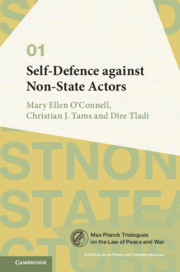Book contents
- Self-Defence against Non-State Actors
- Max Planck Trialogues on the Law of Peace and War
- Self-Defence against Non-State Actors
- Copyright page
- Contents
- Introduction to the Series: Trialogical International Law
- Introduction Dilution of Self-Defence and its Discontents
- 1 The Use of Force in Self-Defence against Non-State Actors, Decline of Collective Security and the Rise of Unilateralism: Whither International Law?
- 2 Self-Defence against Non-State Actors: Making Sense of the ‘Armed Attack’ Requirement
- 3 Self-Defence, Pernicious Doctrines, Peremptory Norms
- Conclusion Self-Defence against Non-State Actors – The Way Ahead
- Index
3 - Self-Defence, Pernicious Doctrines, Peremptory Norms
Published online by Cambridge University Press: 29 July 2019
- Self-Defence against Non-State Actors
- Max Planck Trialogues on the Law of Peace and War
- Self-Defence against Non-State Actors
- Copyright page
- Contents
- Introduction to the Series: Trialogical International Law
- Introduction Dilution of Self-Defence and its Discontents
- 1 The Use of Force in Self-Defence against Non-State Actors, Decline of Collective Security and the Rise of Unilateralism: Whither International Law?
- 2 Self-Defence against Non-State Actors: Making Sense of the ‘Armed Attack’ Requirement
- 3 Self-Defence, Pernicious Doctrines, Peremptory Norms
- Conclusion Self-Defence against Non-State Actors – The Way Ahead
- Index
Summary
On 21 August 2015, British Prime Minister David Cameron authorised the killing with military force of a British national, twenty-one-year-old Reyaad Khan. Khan and two other men riding in a vehicle with him were blown to shreds by Hellfire missiles launched from a remotely piloted drone. The attack occurred in Syria, despite the fact that the United Kingdom Parliament had voted to restrict UK involvement in the Syrian Civil War. The Prime Minister declared the killings a lawful exercise of Britain’s ‘inherent right to self-defence’1 against a ‘very real threat’.2 The British suspected Khan of recruiting individuals to ISIS3 and of plotting terrorist attacks to be carried out in the UK.4 A few days later, the United States also conducted a drone attack in Syria and announced with a ‘high level of confidence’ that it had succeeded in killing another twenty-one-year-old British national, Junaid Hussain.5
- Type
- Chapter
- Information
- Self-Defence against Non-State Actors , pp. 174 - 257Publisher: Cambridge University PressPrint publication year: 2019

